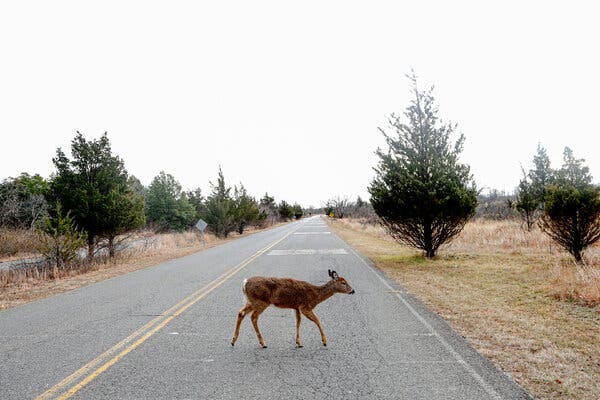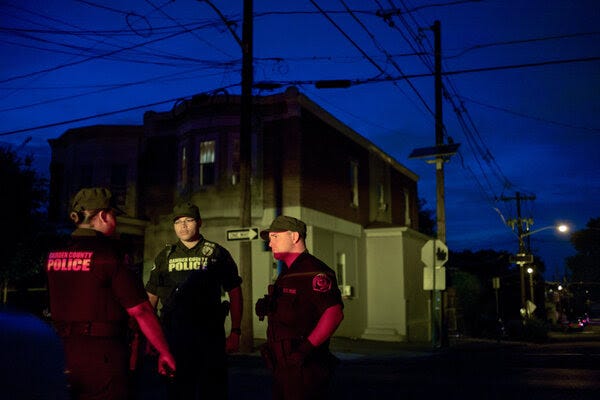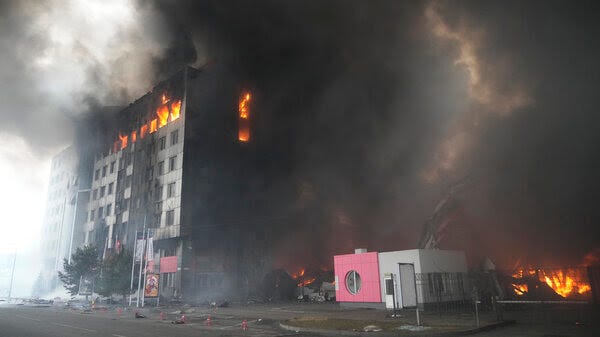The Full Belmonte, 3/6/2022
A Ukrainian sniper preparing his American-donated rifle in Kyiv yesterday.Lynsey Addario for The New York Times
“Russian President Vladimir Putin warned that sanctions imposed by the West were ‘akin to a declaration of war.’” Read more at New York Times
“Russian forces continued shelling near the first routes protected for Ukrainians to flee, apparently violating an hours-old cease-fire.” Read more at New York Times
“U.S. military veterans are traveling to Ukraine to join the fight.” Read more at New York Times
“Cultural institutions are pressing Russian artists to distance themselves from Putin.” Read more at New York Times
“Germans are donating money, offering rooms and volunteering to help Ukrainian refugees.” Read more at New York Times
“WNBA star Brittney Griner has been arrested in Russia on suspicion of illegally bringing drugs into the country after being searched at the airport and found with hash oil in her luggage, according to Russian news agency Tass.
The report states that Griner was stopped by customs control at Sheremetyevo International Airport in February upon arrival in Moscow from New York when a service dog reacted to the presence of drugs. The two-time Olympic gold medalist’s luggage was searched and run through X-ray equipment and vape cartridges of liquid cannabis oil were found.
‘We are aware of and are closely monitoring the situation with Brittney Griner in Russia,’ the Phoenix Mercury said in a statement. ‘We remain in constant contact with her family, her representation, the WNBA and NBA. We love and support Brittney and at this time our main concern is her safety, physical and mental health, and her safe return home.’
Gymnasts from Russia and Belarus are banned indefinitely from international competition
The timing of the arrest was unclear, beyond that it happened last month. But the news of the incident coincides with Russia’s invasion of Ukraine. The United States and other Western and NATO nations have enacted sanctions against Russia and have supported Ukraine with military equipment.
The U.S. Department of State has issued a Do Not Travel advisory for Russia in response to the ‘unprovoked and unjustified attack by Russian military forces in Ukraine’ and the possible ‘harassment against U.S. citizens by Russian government security officials.’ The department added that U.S. citizens should leave Russia immediately and that the Embassy has ‘limited ability to assist U.S. citizens.’
All other WNBA players are out of Russia and Ukraine, according to a WNBA spokesperson. Several prominent WNBA stars are on the rosters of Russian teams including Breanna Stewart, Courtney Vandersloot, Jonquel Jones, Natasha Howard and Arike Ogunbowale….
Cannabis cartridges are devices that contain marijuana in an oil form that can be inhaled by a component that heats the oil into a gaseous state.
Griner is listed on the roster for UMMC Ekaterinburg in Russia and has played on the team for seven seasons. She is a seven-time WNBA all-star after being the No. 1 overall pick in 2013 and is one of the world’s most recognizable women’s basketball players. Many WNBA players spend the offseason playing overseas to supplement WNBA salaries that are not competitive with their male counterparts. Griner is set to have a base salary of $227,900 with the Mercury for the 2022 season.” Read more at Washington Post
“In the wake of Russia’s crackdown on news coverage and the imposition of a new law criminalizing reporting that accurately characterizes the Ukrainian invasion, some international news outlets have taken to technology to circumvent the news blackout, pointing readers to VPNs (virtual private networks), the encrypted Tor browser and even old-fashioned radio.
As war in Ukraine escalates, sending over a million people fleeing and bringing terror to numerous cities, media outlets including the BBC, Voice of America and Radio Free Europe/Radio Liberty (RFE/RL) have been blocked by the Kremlin, along with several Ukrainian sites, Twitter and Facebook. The Russian government has alleged that the sites were providing false news about the war.
But some outlets are refusing to be silenced. In response to the ban, the BBC posted a statement on its website that said, ‘Access to accurate, independent information is a fundamental human right which should not be denied to the people of Russia.’ It attached instructions on how to circumvent the media blackout by accessing BBC content through two apps: Psiphon, a censorship circumvention tool, and Tor, an anonymous browser. Voice of America also vowed, in a statement, to ‘promote and support tools and resources that will allow our audiences to bypass any blocking efforts imposed on our sites in Russia.’
Since the invasion, VOA’s Russian-language site has seen a major increase in traffic, according to Matthew Baise, director of digital strategy and audience development at VOA, rising from 40,000 visits per day to around 250,000, with about 20 percent of that traffic coming through circumvention networks such as VPNs. Patrick Boehler, head of digital strategy at RFE/RL tweeted last week that data from CrowdTangle showed that independent, Russian-language news stories were being shared, worldwide, more often than stories from state-run media.The media blockade is an attempt to control the narrative around the invasion, which the Russian government and state media have insisted on referring to as a “special military operation.” But there are workarounds.
VPNs can help users circumvent Internet restrictions and are already widely used in China — where Internet access has long been restricted by a ‘Great Firewall,’ blocking Facebook, Twitter, the New York Times, The Washington Post and other Western media sites. In a post on its website Saturday, RFE/RL directed people to nthlink — a free VPN service supported by the Open Technology Fund. RFE also provided a link to their website on the TOR browser, which allows users to search the Web anonymously, and encouraged people to join their channel on Telegram, an encrypted messaging platform that Russia tried to ban in 2018.
In a tweet on Friday (and a post on its website), the BBC pointed readers to Psiphon, a free, open-source app created by the University of Toronto’s Internet-freedom center Citizen Lab. Alternately, it directed people to access BBC’s website via the Tor app, widely used during the Arab Spring of 2010 to access blocked social media sites. For anyone unable to download either app — given Russia’s crackdown — the BBC invited people to send a blank email to get@psiphon3.com or gettor@torproject.org to receive a safe link.
Circumventing censorship is sometimes low-tech. In China, social media users have taken to posting upside-down screenshots of articles on platforms such as Weibo (akin to Twitter). Russian readers still have access to RFE/RL’s newsletter ‘The Week In Russia,’ for instance, because email has not been restricted. The BBC announced Wednesday that it would use shortwave radio, a technology used during the Cold War, to broadcast four hours of news each day in Ukraine and parts of Russia.
The blockade of Western media comes amid a week of increased restrictions: Russia shut down many of its own independent media outlets, including Echo Moscow, TV Rain and Meduza. Some journalists have fled the country.
CNN announced Friday that it had stopped broadcasting its programs in Russia. CBS and ABC said they would no longer put their Russia correspondents on air. And the BBC announced that it would halt its journalists’ work in Russia for the time being. ‘We are not prepared to expose them to the risk of criminal prosecution simply for doing their jobs,’ a statement said.
In a related move, a spokeswoman from The Washington Post said that the publication would remove some bylines and datelines from certain stories, to ‘help protect our Moscow-based journalists,’ while the organization seeks ‘clarity about whether Russia’s new restrictions will apply to international news organizations.’
RFE/RL, which operates in 23 countries, has a history of reporting in tightly controlled media environments and has led digital-literacy campaigns in several countries. An RFE/RL employee, who spoke on the condition of anonymity because he was not authorized to comment on behalf of the organization, told The Post that the organization had shown people in Afghanistan how to wipe information from their phones in case they were stopped at Taliban checkpoints, and had taught Ukrainians how to use VPNs.
In Russia, RFE/RL has set up multiple mechanisms to evade censorship. Its mobile app has censorship-circumvention tools built into it, and the organization has made so-called mirror websites that reproduce whatever is on the official homepage. If the state blocks one mirror site, it’s easy to make another. ‘It’s like this cat-and-mouse game,’ the staffer said. ‘But we’re just a very, very fast mouse.’” Read more at Washington Post
“Former vice president Mike Pence on Friday night said there is no room in the Republican Party for ‘apologists for Putin’ in an apparent swipe at former president Donald Trump.
In a speech to GOP donors in New Orleans, Pence referenced the Russian invasion of Ukraine. As the United States and international community have responded with wide-ranging, extensive sanctions against Russia, Pence said now was not the time for conservatives to voice their support of Russian President Vladimir Putin.
‘Ask yourself, where would our friends in Eastern Europe be today if they were not in NATO? Where would Russian tanks be today if NATO had not expanded the borders of freedom?’ he said. ‘There is no room in this party for apologists for Putin.’
While Pence did not explicitly refer to the former president by name, Trump has been among the loudest, and only, Republican voices supporting Putin. Trump recently described Putin as ‘smart,’ ‘savvy’ and ‘a genius,’ while insisting the attack on Ukraine never would have happened on his watch.” Read more at Washington Post
“Organizers of the ‘People’s Convoy’ said late Saturday that their armada of trucks, cars and SUVs would circle the Beltway on Sunday morning and into the workweek at the minimum speed limit to slow traffic without stopping it and to get their message to lawmakers.
Brian Brase, a convoy organizer, said in an interview that the plan is to drive around the Beltway twice before returning to the Hagerstown Speedway, where the protesters have spent the weekend so far. Each day this week, the convoy will repeat that ritual until the group’s demands are met, Brase said.
He said organizers are working with local enforcement to identify weekday times that would have a minimal impact on traffic. They will drive the minimum legal speed and increase the number of loops around the Beltway each day to pressure lawmakers and public officials, he said.
Sunday “is a show of just how big we are and just how serious we are,” said Brase, a 37-year-old truck driver from northwest Ohio who helped organize the convoy. ‘But it’s very easy to get rid of us.’ He has said the group wants an end to the national emergency declaration in response to the coronavirus — first issued by President Donald Trump in March 2020 and later extended by President Biden — and for Congress to hold hearings investigating the government’s response to the pandemic.” Read more at Washington Post
“(CNN)Six people -- including two children -- died in a tornado near Des Moines, Iowa, Saturday, officials said.
The two children who died were under the age of five, Madison County Emergency Management Director Diogenes Ayala said.
‘This is, I think, the worst anyone has seen in quite a long time,’ Ayala said.
The tornado in Madison County, which is southwest of Des Moines, also left one adult with life-threatening injuries and three others hospitalized in serious condition, Ayala said.
The National Weather Service office in Des Moines said an initial estimate shows it was an EF3 tornado, with wind speeds of at least 136 miles per hour.” Read more at CNN
“SALT LAKE CITY — Utah Gov. Spencer Cox said he plans to veto legislation passed Friday that would ban transgender student-athletes from competing in girls sports.
With the governor’s pledge to veto the bill, Utah is poised to become the first state this year to reject an anti-trans sports bill approved by its legislature.
Without Cox's support, the state is unlikely to join the 11 others that have recently enacted bans on transgender girls competing on school sports teams corresponding with their gender identity.
In vowing to veto the bill, Cox directly addressed transgender student-athletes, who he said found themselves the subject of political debate through no fault of their own.
‘I just want them to know that it's gonna be okay. We're gonna work through this,’ Cox said.
Cox's announcement was lauded by LGBTQ rights groups.
‘As the first governor this year pledging to veto anti-trans legislation sent to his desk for signature, Gov. Cox deserves praise for standing up to those who continue to target and attack transgender youth,’ Human Rights Campaign state legislative director Cathryn Oakley said in a statement following the news.” Read more at USA Today
“The Biden administration is urging Congress to pass a spending package before government funding expires on Friday.” Read more at New York Times
“School mask requirements will lift for millions more students — in New York, Philadelphia and on the West Coast — this week.” Read more at New York Times
“Scientists have identified a new, highly mutated version of the coronavirus in white-tailed deer in southwestern Ontario, one that may have been evolving in animals since late 2020.
They also found a very similar viral sequence in one person in the area who had close contact with deer, the first evidence of possible deer-to-human transmission of the virus.
‘The virus is evolving in deer and diverging in deer away from what we are clearly seeing evolving in humans,’ said Samira Mubareka, a virologist at Sunnybrook Research Institute and the University of Toronto and an author of the new paper.
The report has not yet been published in a peer-reviewed journal, and there is no evidence that the deer lineage is spreading among, or poses any elevated risk to, people. Preliminary laboratory experiments suggest that the lineage is unlikely to evade human antibodies.” Read more at New York Times
Police officers in North Camden, N.J.Todd Heisler/The New York Times
A false choice
“Debates over crime reduction are often binary, pitting the police against alternative approaches.
President Biden got bipartisan applause at his State of the Union speech this past week when he declared, ‘The answer is not to defund the police. It’s to fund the police.’
But it is actually not an either-or between law enforcement or other options. Biden made that clear, pushing against a false choice ‘between safety and equal justice.’
Both sides work best together, experts said: Policing stops violence in the short term, while other social services offer ways out of a life of crime over the longer run.
‘You want to invest in policing — in proper policing,’ said Jamein Cunningham, a criminal justice expert at Cornell University. ‘But you have all these other areas that need to be addressed,’ he added, citing poverty and lack of access to education as contributors to crime.
More focused policing — targeting the people, places and problems that disproportionately contribute to violence — is effective. In 2009, violent crime fell in Philadelphia after officials deployed foot patrols to high-crime areas. Targeted policing strategies in dozens of other cities have produced similar results.
Alternative approaches to reducing crime have worked, too. Summer job programs consistently lower criminal activity among participants; one in New York City reaches 75,000 young people each year. A Philadelphia program that turned vacant public spaces into parklike settings reduced shootings, burglaries and crime overall.
Although it has gotten less attention amid news of Covid, inflation and war in Ukraine, the U.S. is enduring a spike in homicides. The country’s murder rate last year reached its highest point in a quarter-century.
So far in 2022, murders in U.S. cities, including New York, Chicago and Philadelphia, are up even more overall, according to the crime analyst Jeff Asher. Elevated levels of violence may not be a pandemic-induced blip.
Americans seem worried: 51 percent of adults in 2021 said they believed more crime was happening in their area, up from 38 percent in 2020, Gallup found.
A comprehensive response to this problem would cost potentially billions of dollars nationwide — more than some cities and counties can pay for, at least without federal support. But any action, experts say, could make a difference.
Better policing
Policing, in general, reduces crime and violence. Every addition of 10 officers prevents one homicide, a study found. The effect on the number of Black people killed is twice that.
But policing as it is widely practiced now also carries grave costs, including harassment, wrongful arrests and deaths, which disproportionately hurt minority communities.
The best policing approaches focus on the slivers of city blocks and other places where crime and violence often break out, known as ‘hot spots.’ They comprehensively take on underlying problems contributing to crime, like drugs, guns and housing. They target repeat offenders.
In much of the country, such strategies require a rethinking of policing, leaving behind more confrontational and sweeping tactics. Those aggressive approaches are largely ineffective — and they can backfire, turning communities against the police.
Eugene, Ore., has handled service calls without involving the police.Chris Pietsch/Register-Guard, via USA Today Network
Other solutions
Non-policing strategies can complement law enforcement, particularly programs that help people lead healthy, productive lives.
‘If we hopefully bring the right package and right resources to other social programs, we can have similar or better effects at lower costs and let police focus on doing a more limited job well,’ said Sara Heller, a University of Michigan economist who has studied non-policing solutions.
Early interventions, like preschool programs, seem to reduce arrests later in life. Initiatives for adolescents, such as cognitive behavioral therapy, can reduce crime and violence. Some programs that help people of all ages, including addiction treatment, also appear to help.
Some successful measures focus on improving people’s environments. Installing more street lighting helps fight crime. So does reducing access to alcohol and guns.
The effects of single interventions on crime are usually modest. And some, like violence interrupters, are inconsistent. But many programs have other benefits; getting children into a high-quality preschool or drug users into treatment has value beyond crime-fighting.
Striking a balance
Policing appears to work best in the short term, generating reductions in crime that are nearly immediate but level off over time. The alternative approaches can take longer to work, but their effects can last for years.
Between the 1990s and the 2010s, America’s murder rate fell by more than half. The variety of credible explanations for the decline suggests that no single factor was solely responsible. It was a mix: more and better policing, the end of the crack epidemic, reduced exposure to lead, video games keeping kids indoors and out of trouble, and more.
The balanced approach worked then. For an inherently grim problem, that history is a reason for hope.
For more
Moderate Democrats are increasingly embracing a balanced approach to crime-fighting.
Carjackings are up. Teens may be behind the increase.
Brooklyn’s progressive prosecutor has taken on public safety and criminal justice reforms without the political backlash his peers have faced.
U.S. cities have not, generally, cut police funding.” Read more at New York Times
Efrem Lukatsky/AP
“We've been flooded with horrifying news from Russia's invasion of Ukraine. To help you the most up-to-date information on the war, we've compiled the latest news and analysis on one page. You can also listen and subscribe to the new State of Ukraine podcast to hear quick snippets and explainers from inside the country and around the world.
Here are a few of the most remarkable stories on the war from the week.
Russian President Vladimir Putin is creating a nightmare, not just for the Ukrainian people but for himself as well, an expert in U.S.-Russia relations says. He is ‘destroying the very thing that he wished either to take or to create in Ukraine,’ Michael Kimmage tells NPR's Terry Gross.
Russian police have arrested thousands who protested in the streets against the war, including five children, ages 7 to 11, jailed for carrying flowers and handmade signs reading ‘No to War’ to Ukraine's embassy in Moscow.
Europe has welcomed Ukrainian refugees with open arms. Many have noted it's a far cry from the cold shoulder refugees from the Middle East and Africa have received.” Read more at NPR
Noel Celis/AFP via Getty Images
“Striking new evidence points to the animals at the Wuhan seafood market as the point where the coronavirus originated — foreshadowed by photos from 2014 of raccoon dogs and birds. A top virus sleuth gives the details.” Read more at NPR
“Doctors' worst fears about Texas' new abortion law are coming true. The law bans almost all abortions after about six weeks of pregnancy, and many are feeling frustration and disbelief as they navigate the new legal environment.” Read more at NPR
“DURHAM, N.C. — Playing the ultimate villain, North Carolina stunned archrival Duke in arguably the most hyped-up game in the Tobacco Road rivalry.
The Tar Heels upset the Blue Devils 94-81 Saturday at Cameron Indoor Stadium on a day that was dominated by the pageantry of Mike Krzyzewski coaching the final home game of his 42-season career.
Instead of a victorious coronation for the winningest coach in men's college basketball history, it was a court-storming affair for a gritty and determined UNC team that was on the NCAA tournament bubble entering the day.
Krzyzewski was disappointed when he returned to the court for a ceremony celebrating his career.
‘I'm sorry about this afternoon. Today was unacceptable,’ he said. ‘But the season has been very acceptable. The season isn't over.’












